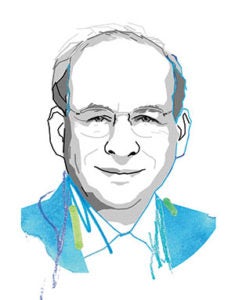A Note of Gratitude

It’s a daunting prospect to write my last column for Rice Magazine, and evokes emotions of both joy and sadness. There are so many things I would like to say, but I have space here for just two broad ones.
The first is thank you. While there are innumerable individuals to thank, today I’m going to limit myself to the various Rice constituencies, in no particular order. Thank you to our students, graduate and undergraduate, who every day give us a sense of purpose and possibility. Our students challenge us constantly to “do better,” and even when we don’t always agree, the result in some ways is to make us all do better collectively. Having taught four semesters during my time as president, I have been able to see firsthand just how extraordinary our students are.
Thank you to our faculty, who both define and constitute the quality and impact of both our teaching and research. Our faculty has given all of us so much pride over the last 18 years — pride in the quality of our instruction and pride in what we contribute to our understanding of the world, to our cultural enrichment and to human progress. Rice has, more than ever, been at the forefront of a wide range of endeavors, from musical composition to neuroengineering and from quantum mechanics to art history.
Thank you to our alumni, parents and friends, who are our ambassadors around the globe and make so many of our endeavors possible. It has been an invigorating experience for Ping and me to visit with you, whether in Houston, across the nation or around the world.
Thank you to our extraordinary staff, who bring not only talent and competence to their work, but ambition and caring as well. Whether it is our facilities engineers, our groundskeepers, our custodians, our faculty assistants and departmental and center administrators, our IT support staff, our admissions and library staffs, our student support services, athletic personnel, research and teaching support staff and so many others, they are driven to make Rice the community and university we aspire to be. They are led by an amazing administrative team, who have sought in every respect possible to make Rice better, safer, more ambitious and more responsive.
When I made the decision to come to Rice over 18 years ago, I was inspired by the aspirations and achievements of a small university that was less than a century old. These 18 years have been exciting as we have changed our great institution in important ways. I am proud of what we have changed together, but equally proud of what we have chosen not to change.
Thanks to the leaders, residents and great institutions of the Houston metropolis, who also have supported us, engaged with us and collaborated to provide opportunities for faculty and students. And finally, a shout out to the architects and artists who have had such an impact on our campus, enhancing beauty and functionality and creating surroundings that truly serve our ambitions and inspire our creative best.
I also wanted to share some thoughts on what I see as the key challenge that has confronted Rice during my time, and I think will continue to do so. Rice was founded with extraordinary aspiration and ambition. Rereading Edgar Odell Lovett’s speeches should convince anyone of that, and we often use his phrase, “no upper limit.” At the same time, we were founded with some distinctive attributes and others have evolved over time. The challenge is constantly to make the changes that we need in order to achieve our aspirations and continue to rise in an increasingly competitive, dynamic and complex higher education environment and yet remain true to the most positive aspects of our culture and our values.
For example, we have returned to our roots in some ways by adopting the Rice Investment, making our university tuition free for all those from families earning less than $140,000 and reducing our tuition by 50% for those earning less than $200,000. And we have emphatically rejected a part of our history, namely our racially exclusionary origins, and now have one of the most diverse undergraduate student bodies in higher education. The implementation of the Rice Investment drew incredible support from our graduates in part because of its firm anchor in Rice history and values.
Our growth and increasing breadth of our mission in many respects understandably causes concerns about whether we will be the Rice our alumni remember. The answer is undoubtedly no in the literal sense of the question. But if we mean instead to ask, as we constantly must, whether we are the Rice of the values and contributions we were proud of, and if we adapted to a changing and competitive world in pursuit of both new aims and those values, then that and not stasis is the embodiment of “To Rice Be True.”
When I made the decision to come to Rice over 18 years ago, I was inspired by the aspirations and achievements of a small university that was less than a century old. These 18 years have been exciting as we have changed our great institution in important ways. I am proud of what we have changed together, but equally proud of what we have chosen not to change.
With the utmost gratitude,
David W. Leebron
